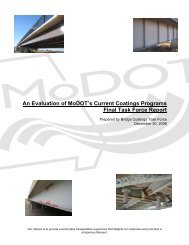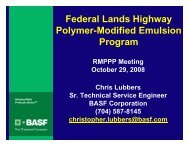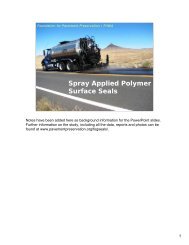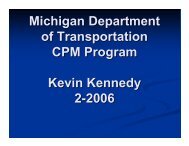Using Polymer Modified Asphalt Emulsions in Surface Treatments A ...
Using Polymer Modified Asphalt Emulsions in Surface Treatments A ...
Using Polymer Modified Asphalt Emulsions in Surface Treatments A ...
Create successful ePaper yourself
Turn your PDF publications into a flip-book with our unique Google optimized e-Paper software.
destruction of the polymer modifier. As has already been demonstrated, the effective<br />
length of storage of polymer modified asphalt emulsions, even under ideal conditions,<br />
can vary widely depend<strong>in</strong>g upon the modifier and bitumen types, and the degree of<br />
polymer-asphalt compatibility. When stor<strong>in</strong>g and handl<strong>in</strong>g prepared asphalt emulsions,<br />
the follow<strong>in</strong>g general guidel<strong>in</strong>es are recommended:<br />
• In general, store the emulsion between 10º and 85º C. depend<strong>in</strong>g upon the<br />
<strong>in</strong>tended use and the particular grade of emulsion be<strong>in</strong>g utilized;<br />
• Do not heat the emulsion above 85º C. dur<strong>in</strong>g storage as this may cause excess<br />
water evaporation. Similarly, excessive and prolonged temperatures above 100º<br />
C. can cause breakdown of the emulsion and/or destruction of its polymer<br />
components;<br />
• Avoid prolonged periods of storage, and make sure the mixture is gently and<br />
cont<strong>in</strong>uously agitated;<br />
• Ma<strong>in</strong>ta<strong>in</strong> an accurate temperature history and collect frequent measurements;<br />
• Do not allow the asphalt emulsion to freeze, as this breaks the emulsion and<br />
causes phase separation and mixture <strong>in</strong>stability; and,<br />
• Do not use forced air to agitate the emulsion as this too may cause it to break<br />
prematurely (1, 51, 52).<br />
DSR test<strong>in</strong>g conducted after simulated ag<strong>in</strong>g with a Roll<strong>in</strong>g Th<strong>in</strong> Film Oven (RTFO-<br />
DSR) of properly cured polymer modified emulsion residue <strong>in</strong>dicates that unmodified<br />
asphalt emulsion contam<strong>in</strong>ation present with<strong>in</strong> storage tanks or product transfer l<strong>in</strong>es<br />
may adversely impact performance (52). Similarly, some reductions <strong>in</strong> RTFO-DSR<br />
performance were noted with <strong>in</strong>creas<strong>in</strong>g storage times, which, when comb<strong>in</strong>ed with<br />
product contam<strong>in</strong>ation, resulted <strong>in</strong> even more pronounced degradation of RTFO-DSR<br />
results (52, 53).<br />
However, when modified non-emulsified asphalt b<strong>in</strong>ders were tested us<strong>in</strong>g comparable<br />
protocols, results <strong>in</strong>dicate that the impact of prolonged storage, elevated temperatures,<br />
40
















